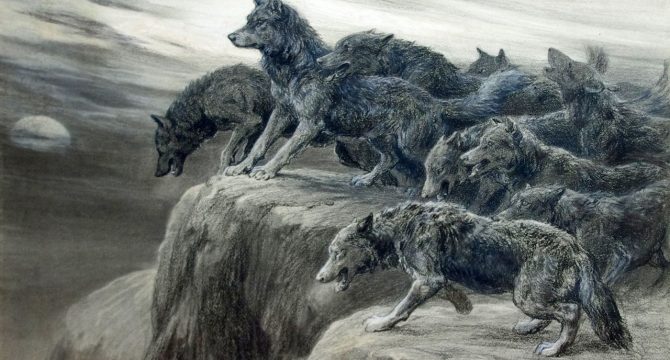D.H. Lawrence (1885-1930) var en av 1900-talets stora författare, han var också en av de mest givande civilisationskritikerna. Hans analys av den tilltagande separationen mellan blood-consciousness och mind-consciousness påminner exempelvis starkt om den tyske biocentrikern Ludwig Klages och erbjuder en synnerligen värdefull nyckel för att förstå politisk korrekthet, etnomasochism och besläktade fenomen. Lawrence hade 1922 fått Klages bok Vom Kosmogonischen Eros, men likheterna handlar snarare om att ”great minds think alike”. De tycks ha nått liknande slutsatser på var sitt håll, hos Klages framförda med tysk prägel och tyskt djup, hos Lawrence mer anglosaxiskt men också mer biologistiskt och för samtiden lättillgängligt. Det är till exempel lättare att analysera politisk korrekthet med utgångspunkt i Lawrence än Klages.
Ett intressant exempel på Lawrences tänkande är hans försök att utforska och sätta ord på olika nationalkaraktärer. Idag är detta ett kontroversiellt projekt, inte minst om man som Lawrence också betraktar ras som en faktor i ekvationen. Men det är inte desto mindre fascinerande. I den postumt utgivna samlingen av essäer och dikter med namnet Phoenix finns det en avdelning betitlad Peoples, Countries, Races. Vi får där bland annat veta att amerikanerna istället för att avundas Europas kultur måste inspireras av de för-kolumbianska civilisationerna, ”Americans must take up life where the Red Indian, the Aztec, the Maya, the Incas left it off. They must pick up the life-thread where the mysterious Red race let it fall”. Till detta återkom Lawrence ofta, inte bara i den kända romanen The Plumed Serpent. I Taos skrev han att ”here in Mexico the fangs are still obvious. Everybody knows the gods are going to bite within the next five minutes. While in the United States, the gods have had their teeth pulled, and their claws cut, and their tails docked, till they seem real mild lambs.” Försöken att ringa in den indianska religiositeten, race of spirit för att tala med Evola, för inte sällan tankarna till Castaneda.
Intressant är också Lawrences förhållande till det tyska. Han var ambivalent, men genom sin fru Frieda kom han i kontakt bland annat med vänner till Werner Sombart. Inflytandet från Nietzsche är också tydligt hos Lawrence. Samtidigt betonades inte sällan det främmande hos tyskarna. I reseminnen från Metz skrev han att han föredrog fransmän framför tyskar, bland annat för att ”a Frenchman has the same soul, whether he is eating his dinner or kissing his baby. A German has no soul when he is eating his dinner, and is beautiful when he kisses his baby. So I prefer the Frenchman who hasn’t the tiresome split between his animal nature and his spiritual, in whom the two are fused.” Värd att läsas parallellt med Jungs Wotan är Lawrences Letter from Germany. Han beskrev där mellankrigstidens och inflationens Tyskland som en plats där märkliga ting ägde rum, inte minst i det omedvetna. Han skrev att ”the moment you are in Germany, you know. It feels empty, and, somehow, menacing. So must the Roman soldiers have watched those black, massive round hills: with a certain fear, and with the knowledge that they were at their own limit. A fear of the invisible natives. A fear of the invisible life lurking among the woods. A fear of their own opposite.” Tendensen till samarbete med öst snarare än Västeuropa hos bland annat Niekisch identifierades av Lawrence med hjälp av hans esoterisk-psykiska nodalitetsperspektiv, ”the great leaning of the Germanic spirit is once more eastwards towards Russia, towards Tartary.” Det är suggestiv prosa, med inslag som ”something about the Germanic races is unalterable. White-skinned, elemental, and dangerous” och ”money becomes insane, and people with it.” Blodet och skogarna lyfts fram, ”the ancient spirit of prehistoric Germany coming back, at the end of history”. I förbigående kan noteras att den ”blood-conscious” mytisering Lawrence här genomförde avseende germanerna hade varit ett möjligt alternativ till den exotisering av det utom-europeiska som ägde rum under 1900-talet med kända konsekvenser. Idag är den istället demoniserad och väcker starka men negativa känslor hos de blodfattiga mellanskikten låsta i en loop av alienering och självhat.
Letter from Germany är alltså en liten pärla och en inblick i vad som ägde rum i det tyska omedvetna under mellankrigstiden. Givande inblickar erbjöd Lawrence också i Fantasia of the Unconsious. Han kommenterade där allt från psykoanalys och barnuppfostran till polariteten mellan könen och massans läsvanor. Det sistnämnda ställde han sig kritisk till, ”I don’t intend my books for the generality of readers. I count it a mistake of our mistaken democracy, that every man who can read print is allowed to believe that he can read all that is printed. I count it a misfortune that serious books are exposed in the public market, like slaves exposed naked for sale. But there we are, since we live in an age of mistaken democracy, we must go through with it.” Avseende Freud noterade han att ”the unconscious is not, of course, the clue to the Freudian theory. The real clue is sex. A sexual motive is to be attributed to all human activity”. Vilket enligt Lawrence är direkt felaktigt, den andra impulsen är ”the desire of the human male to build a world”. Lawrence talade här om den sexuella impulsen och den kreativa eller religiösa, och utforskade den ständigt latenta konflikten dem emellan (”sex holds any two people together, but it tends to disintegrate society, unless it is subordinated to the great dominating male passion of collective purpose”). Fantasia är ett fascinerande stycke civilisationskritik, där Lawrence bland annat angrep samma fenomen som Klages gav namnet Geist, i stycken som ”the ideal mind, the brain, has become the vampire of modern life, sucking up the blood and the life. There is hardly an original thought or original utterance possible to us. All is sickly repetition of stale, stale ideas”. Han angrep även skolan, inte minst den könsblandade (”the nice clean intimacy which we now so admire between the sexes is sterilizing. It makes neuters. Later on, no deep, magical sex-life is possible”). Han berörde också samtida tendenser på ett sätt som för tankarna till Evolas gynekokratibegrepp, ”Man has now entered on to his negative mode.. his being so, the whole tendency of his nature changes. Instead of being assertive and rather insentient, he becomes wavering and sensitive.. Woman meanwhile becomes the fearless, inwardly relentless, determined positive party. She grips the responsibility. The hand that rocks the cradle rules the world. Nay, she makes man discover that cradles should not be rocked, in order that her hands may be left free. She is now a queen of the earth, and inwardly a fearsome tyrant. She keeps pity and tenderness emblazoned on her banners. But God help the man whom she pities. Ultimately she tears him to bits.”
Men Lawrence drog också in tyskarna i sin Fantasia. Han knöt det tyska till skogen och träden, rentav till trädkulter. ”The true German has something of the sap of trees in his veins even now: and a sort of pristine savageness, like trees, helpless, but most powerful, under all his mentality. He is a tree-soul, and his gods are not human. His instinct still is to nail skulls and trophies to the sacred tree, deep in the forest. The tree of life and death, tree of good and evil, tree of abstraction and of immense, mindless life; tree of everything except the spirit, spirituality.” Efter att ha känt olust gentemot träd hade Lawrence kommit att förstå dyrkan av dem, ”all the old Aryans worshiped the tree. My ancestors. The tree of life. The tree of knowledge. Well, one is bound to sprout out some time or other, chip of the old Aryan block. I can so well understand tree-worship. And fear the deepest motive. Naturally. This marvelous vast individual without a face, without lips or eyes or heart. This towering creature that never had a face”. I beskrivningen av det tyska hade skogen, i synnerhet Schwarzwald, Svarta skogen, en central plats. ”But when the legions crossed the Rhine they found a vast impenetrable life which had no voice. They met the faceless silence of the Black Forest. This huge, huge wood did not answer when they called. Its silence was too crude and massive. And the soldiers shrank: shrank before the trees that had no faces, and no answer. A vast array of non-human life, darkly self-sufficient, and bristling with indomitable energy. The Hercynian wood, not to be fathomed. The enormous power of these collective trees, stronger in their somber life even than Rome.” Kopplingen german, skog och gotisk konst blir här tydlig (jämför Holger Holms klassiska storverk Magna Gothica).
Sammantaget finner vi flera värdefulla fragment som behandlar det tyska och germanska hos Lawrence, själv bördig från Nottinghamshire och gift med en tyska. Avslutningsvis är hans intresse för det germanska lika aktuellt idag som för ett knappt sekel sedan, givet att vår civilisation är på väg att förgöra sig själv. Ett alternativ behövs, och det finns aspekter av det i det germanska. Vi avslutar dagens text med ett stycke från Fantasia:
For there are not now, as in the Roman times, any great reservoirs of energetic barbaric life. Goths, Gauls, Germans, Slavs, Tartars. The world is very full of people, but all fixed in civilizations of their own, and they all have all our vices, all our mechanisms, and all our means of destruction. This time, the leading civilization cannot die out as Greece, Rome, Persia died. It must suffer a great collapse, maybe. But it must carry through all the collapse the living clue to the next civilization. It’s no good thinking we can leave it to China or Japan or India or Africa — any of the great swarms.
Mer Lawrence
D.H. Lawrence och hans ockulta psykogeografi
D.H. Lawrence och anti-européerna
















